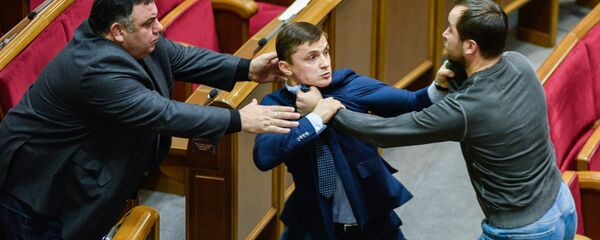MOSCOW (Sputnik) — Russia hopes that Kiev will finally recover from the "orange virus", Russian Deputy Foreign Minister Grigory Karasin said Monday in a comment in connection with the 25th anniversary of establishing diplomatic relations with Ukraine.
"Russia hopes that Kiev will ultimately recover from the "orange virus" and the Russophobic hysteria will give way to sound pragmatism and the mood for establishing constructive interaction. We believe that Ukraine will as a result become a prosperous, predictable and stable state living in peace and harmony with its neighbors," Karasin said.
Karasin said he regretted the fact that Ukraine burned all the bridges between the two countries without taking into account common history and cultural values. Moscow is open for dialogue with adequate and reasonable Ukrainian politicians, he added.
"Moscow is open for dialogue and cooperation with adequate Ukrainian politicians, and ready to restore close mutually-beneficial ties with the brotherly people [of Ukraine]," the diplomat said.
Since 2014, relations between Russia, Kiev, the European Union and the United States deteriorated amid the crisis in Ukraine. Brussels, Washington and their allies introduced several rounds of sanctions against Russia on the pretext of its alleged involvement in the Ukrainian conflict, which Moscow has repeatedly denied. In response to the restrictive measures, Russia has imposed a food embargo on some products originating in countries that have targeted it with sanctions.
The Donbass conflict erupted in April 2014 as a local counter-reaction to the West-sponsored Maidan coup in Kiev that had toppled legitimate President Viktor Yanukovych in February. Residents of the Donetsk and Lugansk regions held independence referendums and proclaimed the People's Republics of Donetsk and Lugansk. Kiev has since been conducting a military operation, encountering stiff local resistance.
Additionally, Ukraine and Russia are locked in a dispute over rail and road transit restrictions on Kazakhstan-bound goods from Ukraine. The restrictions cover goods subject to tariffs or those included in Russia's EU goods embargo. Kiev claims that the limitations violate WTO rules and causes the country economic damage. The restrictions were imposed after the EU-Ukraine Association Agreement came into force and opened a free trade zone between Europe and Ukraine.


